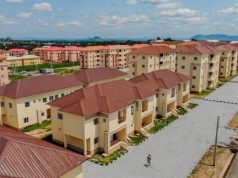
From Our Housing Stand (126)
The Nigerian real estate market is beset by a number of challenging issues, including underdevelopment of rural areas and expensive housing due to the country’s rapid urbanisation.
Nigeria continues to be the most populous country in Africa, home to nearly 218 million people. However, this population is stuck on the shaky train of urbanisation, whose benefits could not outweigh some of its drawbacks, like inflation, underdevelopment, and overcrowding.
This is especially true in big cities like Lagos, Abuja, and Port Harcourt, where population growth is unabated and the cities embrace rapid expansion.
This resolution appears to have resulted from a lack of available homes for lease or renting, an increase in the number of reasonably priced homes in informal settlements (slums) due to overcrowding, and an all-around comprehensive
This resolve appears to have been brought about by a lack of available homes for lease or renting, an increase in the number of inexpensive homes in informal settlements (slums) due to overcrowding, and a general socioeconomic issue that has reduced urban people’ standard of life. In order to address this threat and ensure steady, sustained urban expansion in Nigeria’s real estate market, this editorial examines the tactics and techniques that real estate business coaches and realtors must employ.
Below is a thorough list of tactics that could lessen Nigeria’s housing problems as a result of intense urbanisation, in addition to the potential involvement of real estate business coaches and realtors:
Modalities For Affordable Housing
The partnership between realtors and the Nigerian government can facilitate the implementation of affordable housing initiatives. Policies encouraging the construction of high-quality homes at reasonable prices should be implemented by the government. Reducing tax rates for realtors, providing insurance for building structural maintenance, and offering other incentives to encourage realtors to invest in creating reasonably priced structures are ways to do this. Further eradicating housing shortages in large cities, this partnership will result in an increase in the number of affordable homes available for lease or rent. Urban planner Dr. Ahmed Ogundele says that in order to address Nigeria’s housing gap, which stands at 20 million units at the moment and requires over 700,000 units to address, a multimodal strategy involving the public and private sectors is required.
Rural Development and “Slum” Upgrade
Over half of Nigeria’s urban population, according to UN-Habitat, resides in slums. A larger portion of the population is left sleeping on the streets or stranded without anywhere to stay because there are not as many high-quality structures as there are in this population. “Slums” are generally defined as areas with little to no development, bad roads, an untidy environment, no access to clean water, enough electricity, and other essential environmental needs. This is an opportunity that should be taken seriously. The construction of its pathetic housing structures and the installation of contemporary buildings on vacant land would eventually solve urban cities’ housing shortage problems.
.. Therefore, it is recommended that real estate developers use contemporary building methods to construct homes using reasonably priced goods and materials that, while lacking aesthetic appeal, will yet provide many with high standards of quality and spaciousness.
Urban Planning and Zoning
Maps of homes and roads should be included in every comprehensive plan that the government creates. This strategy would make sure that regulations are in place to direct the adoption and use of land. A well-balanced plan would give the city’s perspective enough clarity to allow for easy management of the significant rural-urban migration that occurs, even in situations where overcrowding is not an issue.
Improved Renting System
One major cause of accommodation challenges in urban cities isn’t that there is a lack of houses for rent, but that these houses are highly unaffordable and can only be accessed by the rich.
According to the Nigerian Bureau of Statistics, rent in urban areas increased by an average of 30 percent between 2015 and 2020, made possible by greedy landlords in the private sector. Improving this plight, in order for realtors to set considerable rental prices, the government needs to regulate the system through the enactment of rent control policies.
These policies should not impose the reduction of rental prices against the cost of production and maintenance conditions of realtors and landlords but should align with these developers enabling them to build cost effective structures that would still yield profit. This alignment would grant access to real estate developers for cheap but durable building materials and shift in tax payment.
Education And Enlightenment
Education in every sector is always paramount; this is also important in real estate. Unfortunately, the Real Estate Developers Association of Nigeria (REDAN) reports that only 20 percent of realtors are currently trained in modern construction techniques. This is a challenge because, with insufficient knowledge, innovative progress can’t be realised.
Realtors should be educated by real estate business coaches on durable sustainable practices that include the encouragement of green building standards and building from scratch on fertile soils with energy-efficient materials. This wouldn’t only address housing issues; it also guarantees infallible structures. Realtors also need to be trained on areas involving market analytics and technological tools since there’s a rapid transition in the world today.
These factors press forth the urgency for real estate coaches and realtors to intervene in the urbanisation-led accommodation crisis, causing heavy challenges for the average Nigerian. Addressing these challenges will significantly contribute to mitigating the difficult situation while supporting the advancement of affordable housing schemes to improve sustainable urban growth. When these problems meet these solutions, living conditions would be improved, the economy would perform twice as well, and urban residents might enjoy an overall quality of life in Nigeria.
Conclusion
Urbanisation is a beautiful thing—so beautiful it adds to the essence of a developing nation. However, this beauty threatens the survival of many in ways that deprive people of basic shelters. While real estate



